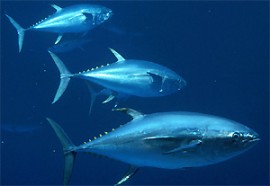
Environmentalists are angry about the decision by the International Commission for the Conservation of Atlantic Tunas (ICCAT) at the weekend to reduce the allowable catch next year from 22,000 to 13,500 tonnes but not to abolish it altogether. Stocks of tuna are at dangerously low levels and might not come back, even if fishing is halted for a while.
But tuna is a popular foodstuff and thousands of jobs in different countries around the world are dependent on meeting that demand. There would be severe economic consequences from closing down the tuna fishery.
Tuna shoals roam widely and often in international waters. National management of tuna stocks would never work, therefore, and since the late 1960s, there has been an international organisation, ICCAT, to take international decisions instead. This is not a blog about fishing, but it is a blog about international organisations and the experience of ICCAT tells us a lot.
What we find is that ICCAT has not worked. Its aim is “to co-operate in maintaining the populations of these fishes at levels which will permit the maximum sustainable catch for food and other purposes”, but from the present state of the tuna population it is clearly failing to meet its aim.
What redress is there? How can ICCAT be brought back to doing what it should have been doing all along, namely conserving tuna stocks?
There is no parliamentary assembly in which these issues can be raised. The only bodies represented in ICCAT are national governments: there is no role for people with a political mandate other than that of the governments themselves. In effect, ICCAT is in the hands of fisheries protection officials. The first step in ensuring proper representation has not been taken.
The second step in ensuring proper representation has not been taken either. The ICCAT system does not include a court in which decisions of the officials can be challenged on the grounds that they are in breach of the ICCAT rules. The people who judge whether the officials of ICCAT are doing a good job are the officials of ICCAT.
But the interest in conserving tuna stocks goes way beyond the officials in the ICCAT system. If tuna stocks are to be protected, ICCAT itself needs to change.
What we see in ICCAT is purest intergovernmentalism at work. Governments are free to act without the awkward incumbrances of public opinion or the rule of law. This, in the world of the euroscepticism, is international decision-making the way it should be. I, along with anyone who really cares about saving fish stocks for future generations, beg to differ.
